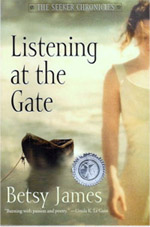by Bentley Clark
I have a confession to make: I don’t know what to write. Now, I don’t mean that I don’t know what to write for this column—although that is a monthly challenge and the source of much teeth gnashing. And I don’t mean that I have writer’s block—although I have been suffering from an extended period of creative constipation. I mean that I don’t know what to write. I have not found my artistic direction or purpose. I am unable to say, “I am a [insert genre here] writer” or “I write [insert form here]” or “I write about [insert insightful thematic topic here].”
In spite of attending conferences and workshops, reading periodicals and following blogs, and in spite of dabbling in several forms and genres, I have yet to experience the creative epiphany to spark my inner artistic tinderbox. The problem isn’t really that I am not drawn to a single genre or form, for all of this literary exposure, but that I am drawn to them all. I want to write scholarly articles for literary journals. I want to write whimsical flash fiction, thrilling short stories and mysterious novels. Oh, turn me loose on screenwriting and see what I can do!
So how to go about reining in this scattershot enthusiasm to focus enough to get myself some artistic direction? To date, I have tried the following:
1. Write what you know. If you’ve met me, you know that the thing I know best of all, my one true love and my arch nemesis, is food. And tea—sweet nectar of the caffeine gods. And yet, I would still rather eat than write about eating and cook rather than write about cooking. Don’t get me wrong, food is art, but I’m not sure that writing about it is my artistic purpose.
2. Find a platform. If a platform communicates your expertise to others, I have to ask “what am I an expert in?” Again… food. Well, that and having no siblings. So, clearly, these two things should be the foundation of my platform. They should be my purpose and direction, right? And yet, being an expert in a thing doesn’t make it your artistic purpose. Maybe my purpose is a genre or topic that I haven’t even tried writing yet. If that’s the case, then platform goes right out the window.
3. Reflect on prior successes. There have been periods in my life when I was prolific and confident. When I was able to strap a muzzle on my inner editor and just keep my head down and write. I wrote well and was proud of it. Shoot, I even won an award now and then. But looking to those times to find direction and purpose for my writing now—and for the future—invites terrifying questions that breed a certain artistic paralysis. Can I write like that again? Are my best days behind me? Best not to look back, really. Better to keep my nose to the grindstone and other platitudes.
There is a mystery and an alchemy to knowing what you are meant to write. I had a friend once tell me that she found her purpose while gently swaying in a hammock in the midsummer gloaming. Absently stroking her cat and nursing a mint julep, she merely conjured it from the magnolia pollen and sunset lithium.
Nah. Not really. But it does seem to be that easy for some, doesn’t it? That their personal identity and artistic purpose are synonymous. That they embody their purpose. I count amongst these purpose-embodiers my Facebook friends: the horror novelist, the science fiction screenwriter, and the contemporary poet. They all seem to have had that hammock-at-the-gloaming epiphany.
But for most of us, it seems more accurate to say that we stumble, drunken-college-student-esque, into our artistic purpose. During lunch at a UNM Department of Continuing Education Start to Sales Conference, my table mates all told stories about how they began writing one thing—a memoir, a travelogue, a textbook—only to discover that they were not, in fact, writing a memoir, travelogue or textbook. And it was the new thing, the thing they hadn’t started out writing that became their passion and defined their purpose. Perhaps that is all purpose-finding is: serendipity.
So, I will continue to proactively stumble towards my purpose. But, just in case my purpose is in search of me as well, I’ll hang my hammock at the corner where serendipity and epiphany intersect.
 Bentley Clark thinks her artistic purpose may have run away from home. If you happen to find it wandering the streets, alone and bewildered, please leave a comment.
Bentley Clark thinks her artistic purpose may have run away from home. If you happen to find it wandering the streets, alone and bewildered, please leave a comment.
This article was originally published in the June 2012 issue of SouthWest Sage and is reprinted here by permission of the author.
Image “Out Of One’s Head, Relax The Brain” courtesy of thaikrit / FreeDigitalPhotos.net


 I carry a journal with me, always. Especially in Mexico.
I carry a journal with me, always. Especially in Mexico. Betsy James is the author-illustrator of sixteen books and many stories for adults, teens, and children. Her latest novel, Listening at the Gate, is a Tiptree Award Honor Book and a New York Times Best Book for the Teen Age. Forthcoming: Roadsouls, her next fantasy, will be available in 2016 from Aqueduct Press. Visit her at
Betsy James is the author-illustrator of sixteen books and many stories for adults, teens, and children. Her latest novel, Listening at the Gate, is a Tiptree Award Honor Book and a New York Times Best Book for the Teen Age. Forthcoming: Roadsouls, her next fantasy, will be available in 2016 from Aqueduct Press. Visit her at 